While streaming an expensive game from Hustler Casino, my friend Tom Dwan played two very interesting hands. Both times his decisions were largely based on reads. I will talk about how I would interpret the situation if I were in his place, and then Tom will take the floor – he sent me several text messages in which he shared his thoughts.
Blinds $500/$1,000, straddle $2,000. Hank raises to $7,000 with . Wesley on the button waiting for his turn with . Before he can get a word, Doug Polk, sitting next to him, says he saw his cards.
“But you fold, right? Wesley asks him.
“I haven’t seen my cards yet, but I know what you have,” Doug replies, spreading his arms.
Wesley finds himself in a strange position: he has a good hand, but the player on the left is lucky that he is not in position, but in the small blind! – presumably knows his cards. Ace-king is not such a big favorite against, say, T7s. If Doug decides to maximize EV in this spot, he should probably call with a hand like T7s to beat him postflop. Doug's position is also ambiguous, and he understands that. In general, there is a lot going on preflop that can be food for thought.
I draw your attention to the fact that Doug not only claims to have seen Wesley's cards, but also tries to get confirmation from him. He repeats this over and over but gets no response. I don't think it's a strong read, but I think it makes aces or kings a little less likely. Against the strongest overpairs, Doug will have much less difficult decisions in such a situation. Another thing – hands like , with which Wesley will 3-bet, and Doug, if he sees a weak pair in such a situation, like will know what's ahead. And with T8s, his equity will be good enough to see the flop. How to behave ethically in such circumstances? Perhaps we should warn Wesley, let him know that it's not worth playing a big pot? With or the crypto investor has no choice, but with or 76s he can play differently.
Wesley, however, 3-bets, and Doug goes to check his cards, not quite understanding what he has to do with a lot of playable hands. It is not his fault that the opponent exposed the cards, but does he have the right to use the information received? Or play the most standard?
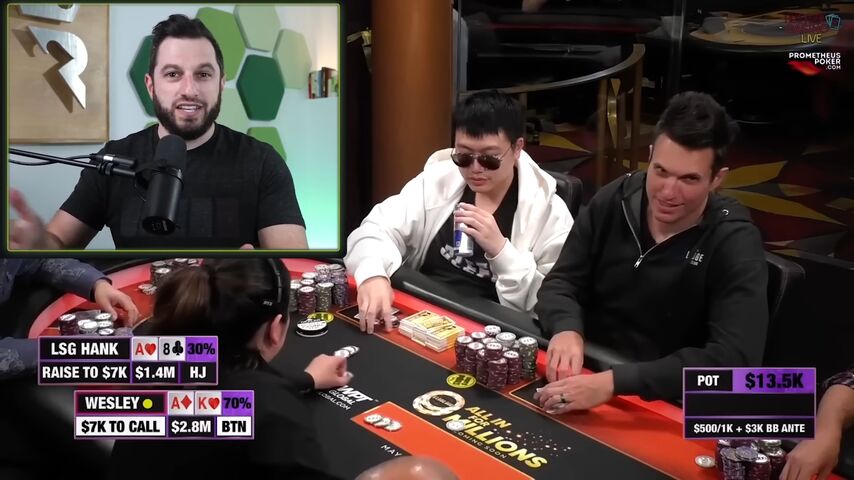
Luckily, his hand turns out to be a rather mediocre T2s and Doug folds with obvious relief.
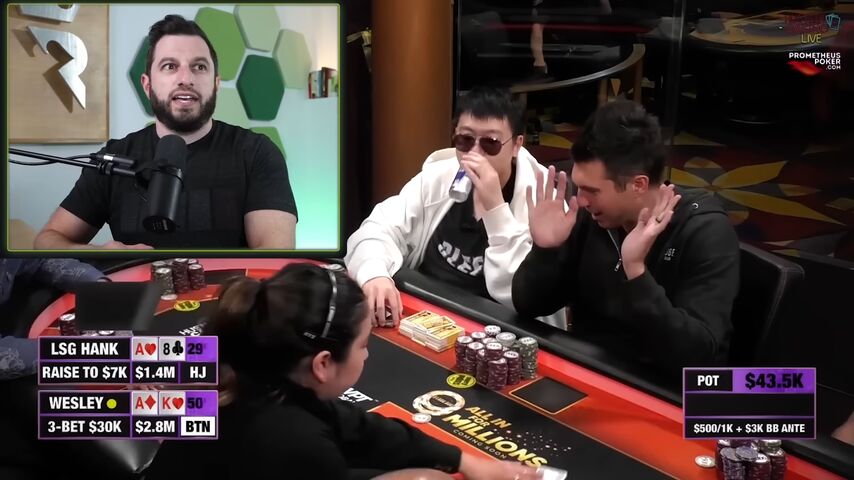
Doug's openly joyful fold is a strong argument that with many other hands in front of him, it would be a more difficult decision, and indirectly indicates that Wesley does not have a high pair.
I don’t think that there is anything reprehensible in Doug’s behavior, on the contrary, he tried to act as ethically as possible, but unwittingly shared information about his neighbor’s cards. And this information is at the disposal of Tom, sitting with a straddle in the first position. And it just so happens that he has a very good hand.
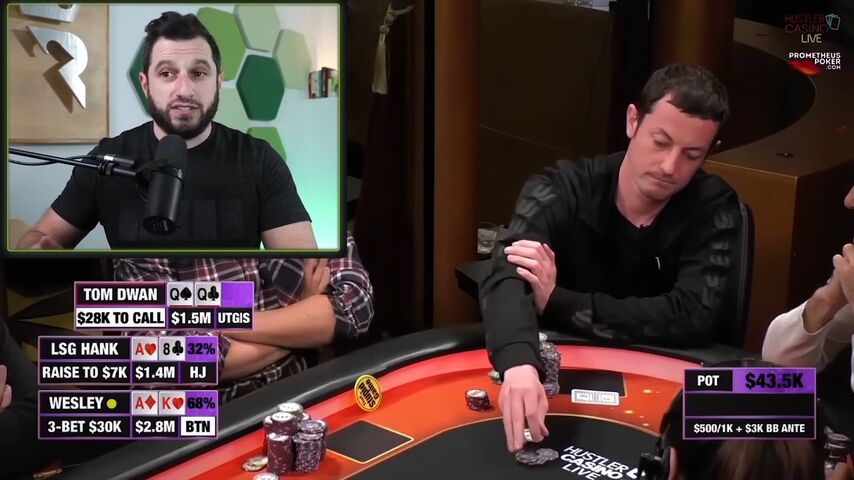
He 4-bets $100,000. In general, this is a fairly standard action in such a situation. Also at this moment, there is a Stand-Up Game – a side bet, which, omitting details, encourages players to more actively fight for pots and expands all ranges.
However, Tom texted me that he would 4-bet anyone but Wesley the least. In his opinion, the crypto investor came to the game with an aggressive attitude, especially against Tom. To avoid difficult decisions, Tom was going to play more conservatively, but an exceptional situation arose in which the proportion of aces and kings can be reduced, and 4-betting became more attractive to him.
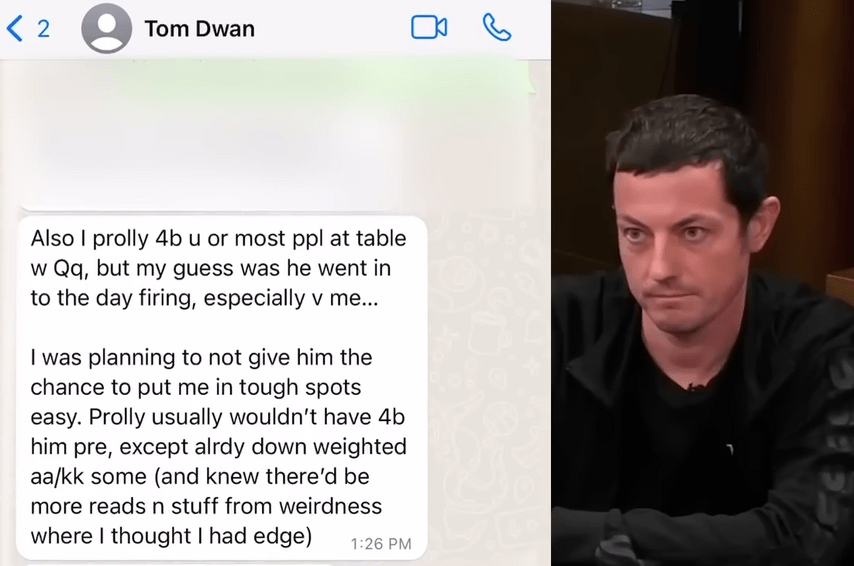
Unlike me, Tom did not attach much importance to Doug's reactions, but he considered very important the silence of Wesley, who ignored the words of his neighbor and 3-bet intently.
Although we came to the same conclusions in different ways, which were later confirmed, these were nothing more than guesses. Reads are never 100% accurate. They only slightly increase the likelihood of certain cards.
After thinking for a while, Wesley 5-bets to $275,000. It blocks aces and kings, so 5-betting is more or less standard. It is not always necessary to do it, but such a line is quite possible. The effective stack at the beginning of the hand is about one and a half million. Tom most likely has the strongest hand, but is he willing to risk 1.5 million for a $400,000 pot? His all-in will only be called by stronger hands. So Tom decides to call.
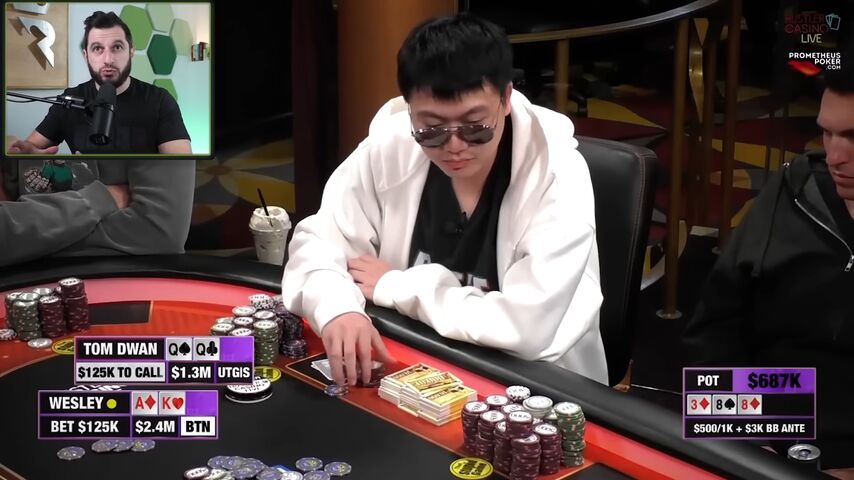
There are two diamonds on the flop, and Wesley has an ace of diamonds, which is a solid continuation bet for him and a solid call for Tom. Reads made pre-flop do not provide a good reason to check-raise. If the opponent is bluffing, let him continue. If we're wrong and it's still aces, or if he's bluffing with a hand containing an eight and hit trips, don't put in all of your chips right away.
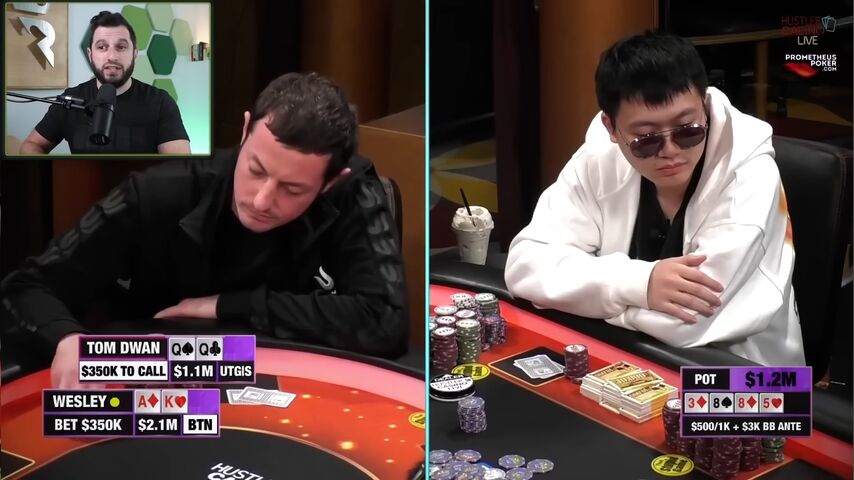
On the blank turn, Wesley continues to bet. Here you can barrel, but you can slow down. Both solutions are perfectly acceptable. Tom calls again.
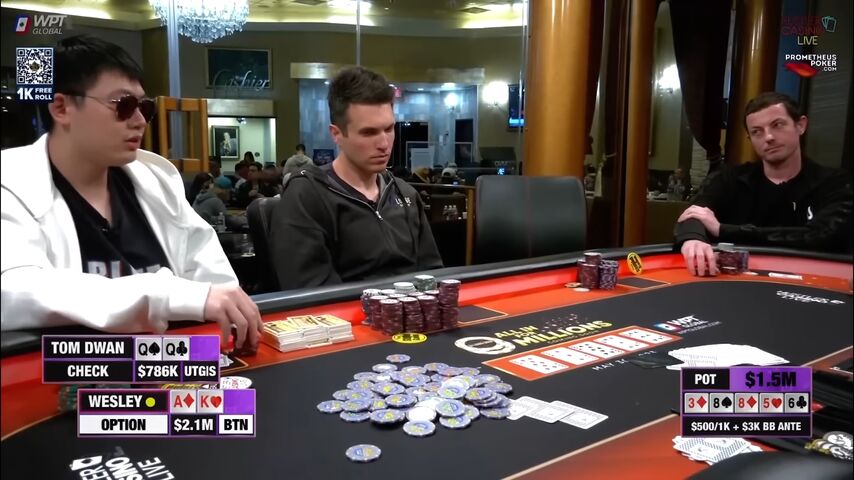
On the river, Tom checks and Wesley goes all in. Tom faces a very expensive decision – there is already $2.3 million in the pot and $786,000 behind him. If called, the pot would top $3 million and become the largest pot in the history of televised poker.
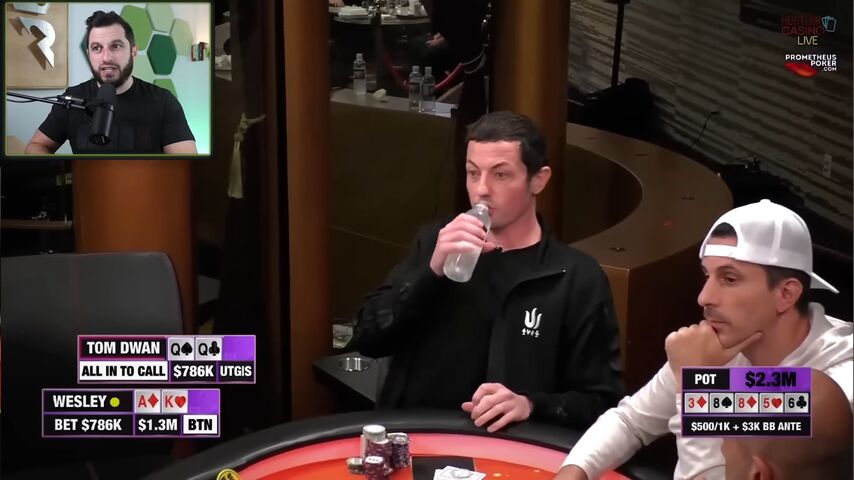
I have known Tom for a long time and I want to say that of all the poker pros I know with whom I discussed hands or any serious non-poker related issues, Tom has the highest speed of thought. In the course of the hand, he collects and analyzes a huge amount of various pieces of information. Both the speed and the depth of his analysis are simply amazing.
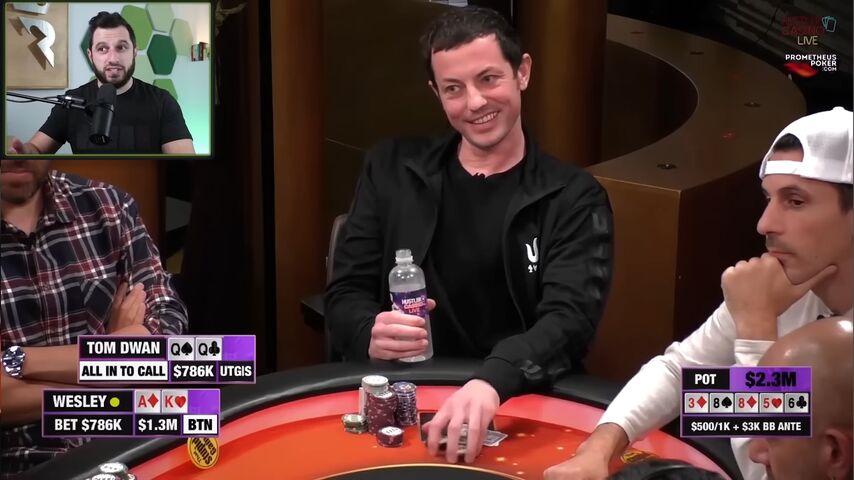
He thinks not only about what happened during the hand, but also remembers all the draws that he saw in the performance of the opponent, and all the accumulated reads on him.
Tom told me that he noticed how quickly Wesley went all in. This is not a classic “quick decision is weakness, slow decision is strength” tell, but something else. The two most likely value hands for Wesley in this situation are aces and kings, but Tom discounted them because of preflop talk. Plus, in such a huge pot, overpairs, especially kings, begin to feel some discomfort. In his opinion, with kings, Wesley would wonder if he even shoved for value and would think longer, and with aces too. So Tom discounted overpairs even more, though not 100% of course. He can also lose to A8s or 98s.
Tom didn't specifically mention it, but it's pretty obvious that Wesley was aware that he had exposed his hand in front of Doug and decided to 5-bet anyway. In my opinion, this is a sign of strength. A bluff 3-bet with T6s doesn't work that way. This consideration raises the probability of the monsters we previously discounted. So the situation is still not so simple.
Ultimately, after weighing the pros and cons, Tom called and won the $3.1 million pot.
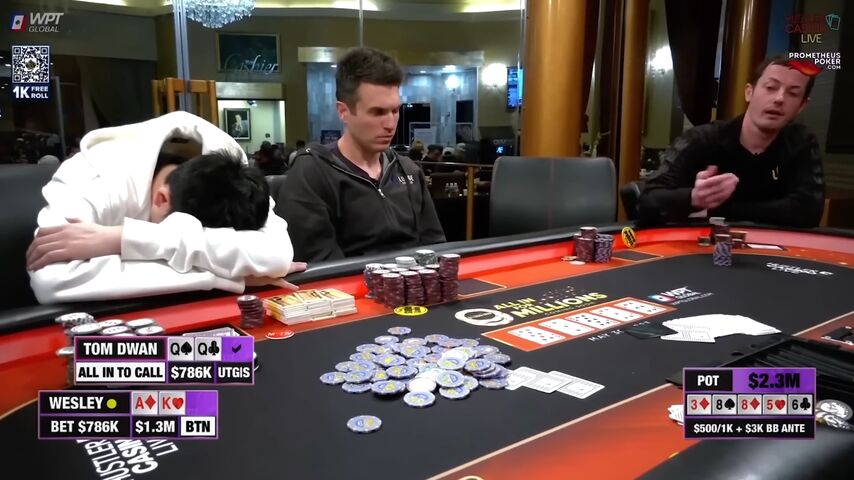
We recently published a detailed analysis of the second hand of this set by Reddit user livepokertheory, so we will focus only on Phil and Tom's key comments.
Doug and Wesley periodically showed each other their cards. After seeing Doug's cards in this hand, Wesley said he liked them. And then hastily added that he liked everything.
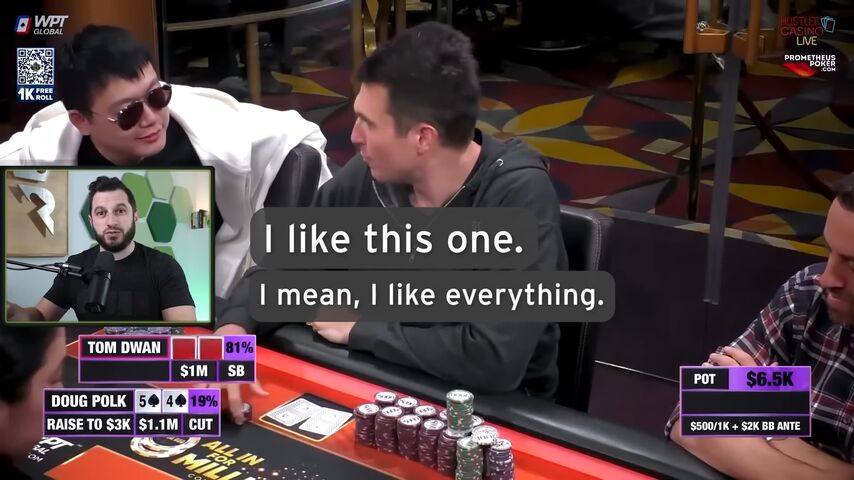
After 3-betting and getting called, Tom flopped a set and bet half the pot. I usually bet less, but it doesn't matter, and the second set is one of the best possible draw hands. Doug has a backdoor flush draw, and a three or six on the turn would give him an open-ended straight draw. He calls. If I hadn't seen this hand, I would have assumed that it was a very borderline fold, but Doug, no doubt, knows the technical side of hold'em better than I do.
The turn is an offsuit six, and Tom continues to bet the same size into half the pot. Doug raises (to $115,000, not to $150,000).
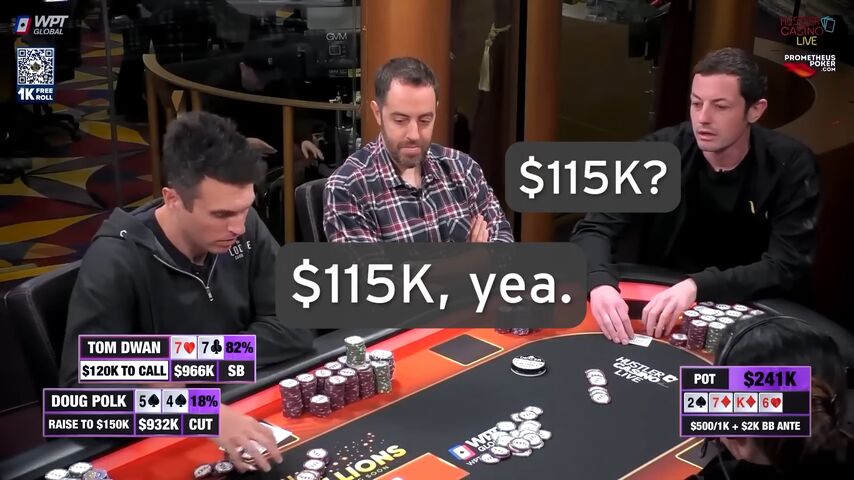
Strong line – he portrays all sets convincingly, although least of all , because with them he will often 4-bet preflop. He has all sets of sevens, sixes, and deuces in his range, but Tom doesn't always 3-bet these hands.
Tom has to choose between calling and 3-betting. In my opinion, the standard play is 3-bet. When making a decision, I would consider Wesley's line preflop. It is unlikely that he would say that about a hand like KQo, AQo, , and here or much more likely.
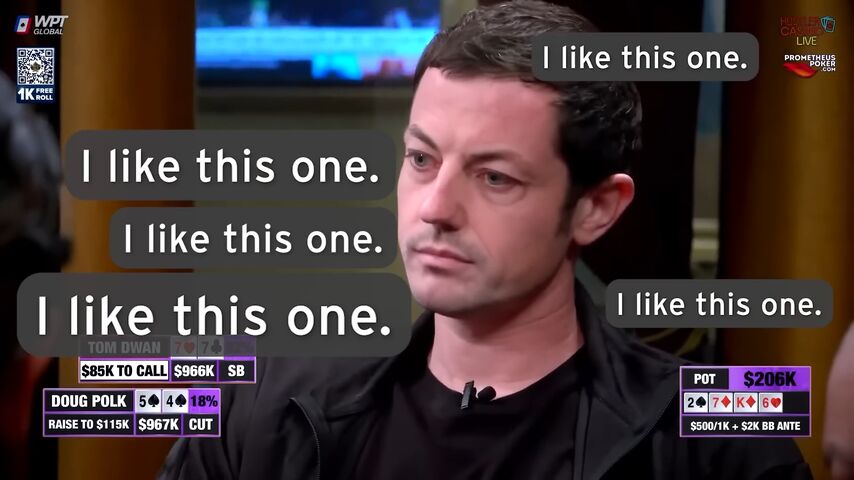
Wesley's words increase the likelihood , 76s, K6s or K7s and of course combo draws – , , and so on. Of course, you have to ask yourself if Doug will call the flop with many of these hands.
It is unlikely that Doug will play along such a line or , but I know people who would raise like this on the turn for thin value and defense, and then check the river. I don't think the solver approves of this play, so these hands are unlikely for Doug, but after Wesley's comment, they can be ruled out almost entirely.
In general, I would 3-bet the turn. And Tom... He was about to do the same when Doug asked the dealer to turn on the timer.
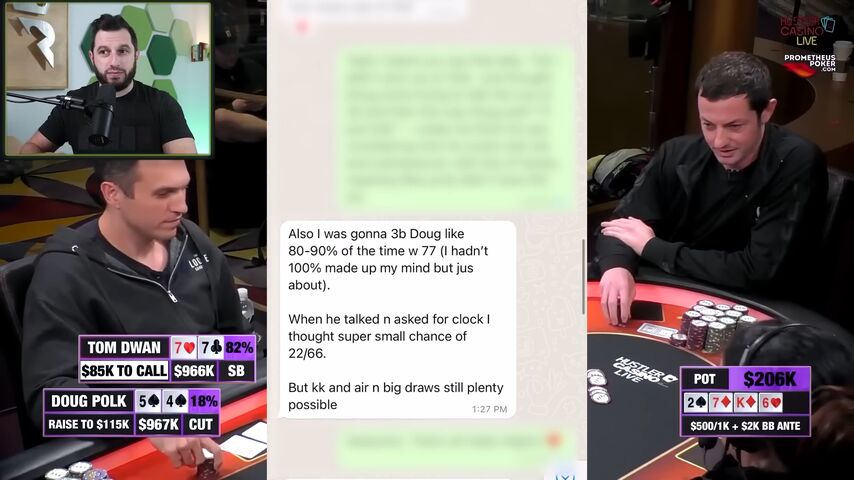
According to Tom, the opponent's desire to speed up the hand dramatically reduces the likelihood of low sets, leaving Doug with a polarized range of top set and strong and weak draws. I personally would not attach much importance to this, but Tom decided otherwise and completely revised his plan in the hand. With his call, he decided to leave all the bluffs to his opponent in order to provoke a continuation on the river.
A six on the river, Tom checks his entire range, and Doug overbet bluffs. I like his choice – he does not block the diamond and is in the lower part of the range. Tom chooses between raising and calling. In my opinion, under normal conditions, this is a push. He beats and , unlikely unlikely and it's just one combination. However, Tom must take into account Wesley's remark and that Doug asked for the clock on the turn. While he is thinking about all this, Doug decides to speed up the process and asks for the clock again.
According to Tom, with a hand like Doug would sit quietly, silently pleading with his opponent to call and never raise. The repeated request to turn on the clock further polarized Doug's range in Tom's eyes and became the decisive argument for a rather tight call.











